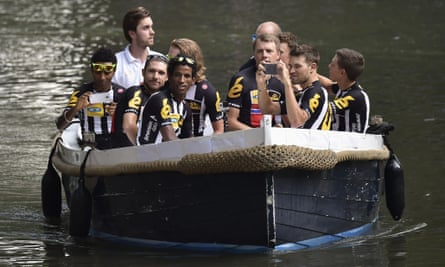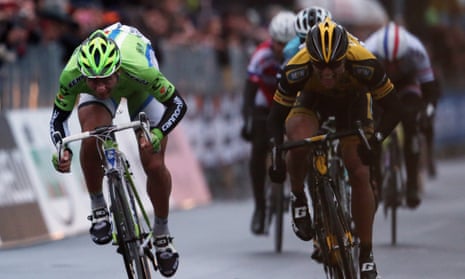Cycling is arguably the most brutal voluntary activity on earth, matching the demands of all other blood sports – war and politics included.
Douglas Ryder, the impresario behind Africa’s first cycling team MTN-Qhubeka, knows all this. Back in 2007, Ryder founded what had long been considered an impossibility: an African-owned, African-sponsored, African-managed professional cycling team designed to race the Grand Tours in general and the Tour de France in particular.
Dougie, as he’s affectionately known in local circles, was smart enough to do away with the politics – Eritreans riding alongside Ethiopians; Rwandan Hutus riding alongside Tutsis; white South Africans riding alongside black South Africans. Ryder was happy to build a pedal-powered scale model of Thabo Mbeki’s African Renaissance.
And Ryder likes to win: the team he assembled, on the back of significant buy-in from the South African cellular megalith MTN, was more advanced than most of the big names in Europe.
He knew that in the post-Lance Armstrong era, cycling teams had to look and feel clean, and it helped to have a significant corporate social responsibility component.
He paired up with the charity Qhubeka, which provides locally assembled bikes to rural South African children. He hired top-notch scientists and nutritionists; and he placed on his roster hardened vets from Germany and Lithuania and Italy to turn his youngsters into pros.
Soon, his cyclists started to win.
Not just African races, but international events, catching everyone’s attention. The first big European result came during the 2013 Milan-San Remo spring classic. In weather so foul the race had to be curtailed, the German Gerald Ciolek won in a sprint finish, beating superstar sprinters Peter Sagan and Fabian Cancellara in the process.

The Tour
Suddenly MTN-Qhubeka was a big deal, impossible to write off as a corporate South African whim, and a wildcard berth in the Vuelta a España followed.
Curiously, further 2014 wildcard entries for the Giro d’Italia and the Tour de France – which along with the Vuelta constitute cycling’s Grand Tours – were not forthcoming. People started to doubt whether MTN would get anywhere in the sport.
But this year, the team has won its entry to the “greatest race on earth”, as its known, La Grande Boucle – the 2015 Tour de France.
Nine men have been picked for the roster, five of them African, kitted out in Cervélo bicycles, Samsung electronics, and other high-end gadgets.
It was the Critérium du Dauphiné, an eight-day stage race that is seen as preparation for the Tour, that tipped Ryder’s hand somewhat. His superb Eritrean climbing specialist Daniel Teklehaimanot won the polka dot jersey, the honour bestowed for claiming the most points on the hills. The Kenyan-born, South African-bred 2013 Tour de France winner Chris Froome took the general classification for the British team Sky.
There were other encouraging signs too. Louis Meintjes, the 23-year-old South African who is perhaps the best cyclist the country has ever produced, made a courageous bid for a mountain stage win. The team looked cohesive, aggressive, and mature. Nothing slapdash about them. They were world class.
But everything up until the first pedal stroke of the Tour de France counts as nothing more than practice. With this in mind, I phoned Ryder to find out how he was managing expectations. His squad is a canny combination of raw talent and grizzled experience, and includes big names such as Norway’s Edvald Boasson Hagen and America’s Tyler Farrar, with newbies including Eritrea’s Merhawi Kudus, who is barely 21.
“We couldn’t be more ready if we tried,” says Ryder.
Unsurprisingly, no one is more bullish on African cycling’s future. “Do I ever think this team will ever be 100% African? No. The international riders are fast tracking our African riders to success – having a rider like Edvald Boasson Hagen, who has been on two Tour de France winning teams with Froome and [Bradley] Wiggins – you can’t buy that experience.
“What I do see is that this international group will slowly become the support riders on this team. Also, we want people from all markets to build visibility for this team – our role is to spread the Qhubeka message.”
As for this being the beginning of an African era, Ryder did not disagree. “Do I think cycling will undergo the major change like marathon running did? Perhaps. But I definitely believe there’ll be a massive transformation happening in the next five to 10 years. MTN can’t sustain all the talent in Africa, but we want African riders to be involved in all the teams in the future. Hopefully over time there’ll be more investment in African cycling, largely because of our pioneering potential. It’s about the sustainability and the growth of it over the continent.”
Whatever happens on the Tour, this is a major moment for African sport, and a cultural watershed for a predominantly white, exclusive sport.

Comments (…)
Sign in or create your Guardian account to join the discussion